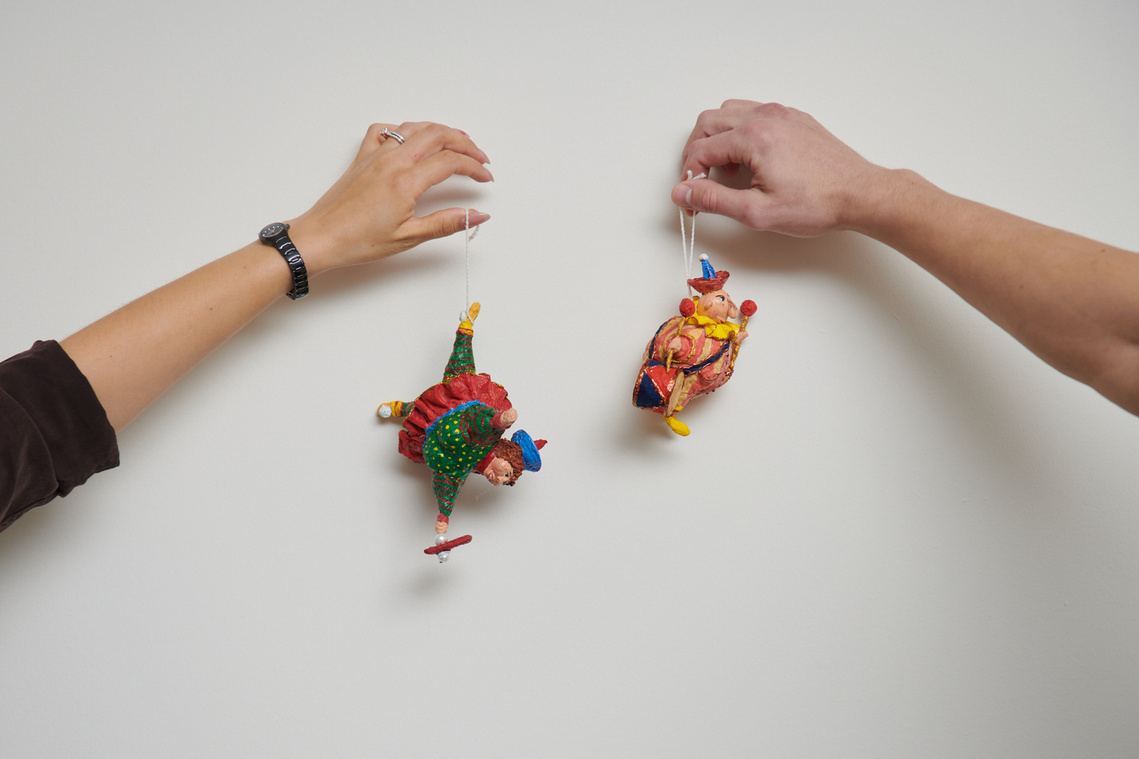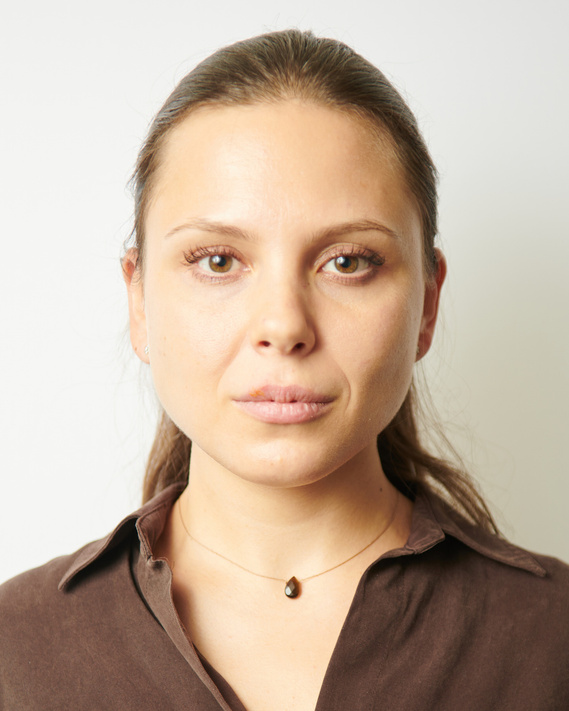War at home
Intimate portrait of Russian-Ukrainian couples
"War at home“ is an intimate look into everyday life of mixed Russian-Ukrainian households.
I was born in Moscow, Russia, Soviet Union collapsed when I was 2 years old. As a child, I spent many summers in Chersonesus, a site of Ancient Greek colony in Crimea. On my mother’s side I’m from Ukrainian Jewish family. Only after the full scale invasion has started, I found out that on my mother’s side, I’m from Ukrainian family (before it, I thought we were a Jewish family somewhere from the south). More than that, my great grand mother is originally from Bakhmut, a town in eastern Ukraine, that was occupied by Russian-backed separatists in 2014 and became a hotspot of military activity during the ongoing conflict.
When I was growing up in Russia, we didn't see a lot of difference between Russia and Ukraine. When someone was from Ukraine, it was just a fan fact about them. I immigrated from Russia partly because of the political reasons, and I support Ukraine in this conflict. But as the full scale invasion split the Slavic hybrid country in half, it also split my identity in half.
"War at home" consists of portraits of couples where one person is from Russia and another person is from Ukraine, everyday objects from their houses, and interviews with them. For this project I got to meet families that immigrated to the states decades ago, as well as someone who left only after Russia moved into east Ukraine in Feb 2022.
Nataly and Danylo
Danylo (28), and his wife Natasha (31). Natasha was born in Saint Petersburg, Russia, and Danylo is from east Ukraine. Danylo has relatives in Crimea (part of Ukraine that was annexed by Russia in 2014) who, as he says, "are zombified" by propaganda and think that Ukraine bombs itself to set up the Russian government. They believe that Russian-speaking people are oppressed in Ukraine, but even Danylo's first language is Russian. He remembers that they even used to make fun of Ukrainian-speaking kids because they were mostly villagers.
Danylo feels ashamed that he's not in Ukraine. When the war started, he asked his friend to teach him how to shoot a gun so he can join Ukrainian army or at least convoy medical supplies and refugees. But his paperwork is not in order, and if he leaves the US, he won't be able to come back. Danylo needs to choose between protecting his motherland or keeping his family. He wrote to his congressman and his senator to speed up his documents but haven't heard back from them yet.
Danylo's hometown of Zaporizhzhia is 30 miles from town of Enerhodar where Zaporizhzhia Nuclear Power Plant is located. This nuclear plant generates almost half of electricity in Ukraine and is a major concern. In the event of an attack or sabotage on the power plant, there is a risk of a release of radioactive material, which could have severe consequences for the surrounding population.
Danylo's hometown of Zaporizhzhia is 30 miles from town of Enerhodar where Zaporizhzhia Nuclear Power Plant is located. This nuclear plant generates almost half of electricity in Ukraine and is a major concern. In the event of an attack or sabotage on the power plant, there is a risk of a release of radioactive material, which could have severe consequences for the surrounding population.
Natasha moved to the US when she was 11. She is not going to visit Russia while Putin's regime is in power. Nataly's grandparents still live in Saint Petersburg, and she is worried she won't see them again because they are too old to travel themselves.
Evelina, Sasha and Teia
Evelina (37) is from Chernivtsi, southwestern Ukraine, her husband Sasha (33) is from Saint-Petersburg. Their daughter Teia (7) doesn't identify with any of these cultures. She says "My mom is Ukrainian, my dad is Russian, and I am Brooklynite". They won't hide from Teia that there's a war, but when I ask her (with permission of her parents) about it, she refuses to talk about it, and goes back to her toys.
Evelina used to volunteer for a non-profit called Razom ("together" in Ukrainian). Her job was to put together first aid kits. The kits are made very sturdy so they don't fall apart in the field. But that makes it very hard to collect them. Evelina's fingers were bleeding after a day in the warehouse. Evelina slowed down only when she found out she was pregnant again.
Evelina got very mad when Sasha tried to tell her she needs to remember to take care of herself too, arguing that one needs to be cold-headed in order to be able to help others. Evelina says she was overwhelmed with emotions, and felt resentment towards all the Russians, including her own husband. Sasha was not offended, he understands that whatever he said back then, it would get a negative reaction.
Evelina and Sasha's daughter Teia's first language is Ukrainian. This is extremely unusual. Sasha learned Ukrainian to make it happen. When the family visited Ukraine just before the war, Teia was shocked that everybody speaks this language. She thought it was their secret language.
Before Teia was born, Sasha and Evelina spoke Russian to each other. But when Evelina learned she was pregnant with Teia, she decided she wanted her to speak Ukrainian. Sasha learnt it too so they all can speak it at home, and now me reads books to her. His Ukrainian is so good right now, that when they travveled to Ukraine, people there did not believe he was from Russia.
Family has a lot of Ukrainian artefacts in their home, including these skirts called gorbotka, that are from Evelina's grandparents. When they visited Chernivtsi, they got Teia this doll, called Motanka. Monatka is believed to have protective and magical properties and is often given as a symbol of good luck, health, and prosperity. The dolls have "empty" faces because Ukrainian ancestors believed that attaching a face could bind a person's soul to the doll.
Nastya and Grigory
Nastya (27) was born in Odessa, and never been to Russia. Grigory (34) was born in Saint Petersburg and never been to Ukraine. Yet when they talk about their childhoods, they find out that it was almost the same. They played same games, they had the same interests, and even their high school buildings had the same layout (shaped as a Slavic letter "П", which the gym and auditorium on one side, a corridor and classes on the other side). I had the same in my school in Moscow.
Gregory is not ashamed to be from Russia, but he understands when people speak badly about it, especially people who were affected by the war. He says he is fortunate, and most people around them understand there's a difference between Russian people and the Russian government, or Russians and Putinists.
Nastya is from Odessa, a port city on the Black Sea coast in southern Ukraine, where 85% of population, including her family, speaks Russian in everyday life. But a few weeks after the invasion started, Anastasiya's mom stopped speaking Russian to her. It made her very mad, she didn't understand what her mom tried to prove to her.
Olga and Sergey
Olga (66) and Sergey (68) retired outside Odessa. Early in the morning February 24th 2022, after Vladimir Putin ordered a full-scale invasion of Ukraine, Odessa was bombed. Olga and Sergey didn't want to leave their home and stayed as long as they could, but eventually fled on February 28th. First leg of their trip, 30 miles drive to Moldovan border, took them 8 hours.
Their son was in their house outside Kiev, the capital of Ukraine, towards the direction Russia was attacking from. She shows me a video on her phone, that he sent. It's a military helicopter flying over our house. You can hear his voice saying, "One helicopter was shot down already, and another one is shooting", and then a frantic female voice telling someone on the phone "there are explosions here!"
Olga used to be very close with her uncle, who lives in Russia. She called him on February 24th and heard his wife saying that the bombing was staged by the Ukrainian government. Later his wife sent her a message that she was very happy that "Ukrainian fascist regime" will fall.
Sergey is retired but has a military background. He was always the head of the family, but the war broke something in him. He leaves the room during our interview and comes back in the end of it to show me Russian propagandist videos. Olga says he watches them every day.
Three suitcases are all Olga and Sergey could bring with them when they fled Ukraine. Olga did not know what clothes to pack, because they didn't know how long they will be away from home. Days? Weeks? When this picture was taken in November 2022, the full-scale invasion has been going for 253 days.
Consider donating to charities that provide help to Ukraine. For example, to Razom, the group that Evelina volunteered for.
This project in ongoing.
If you know any mixed Russian-Ukrainian couples (or if it’s you!), please send me an email at lisa@lisapavlova.com.




















